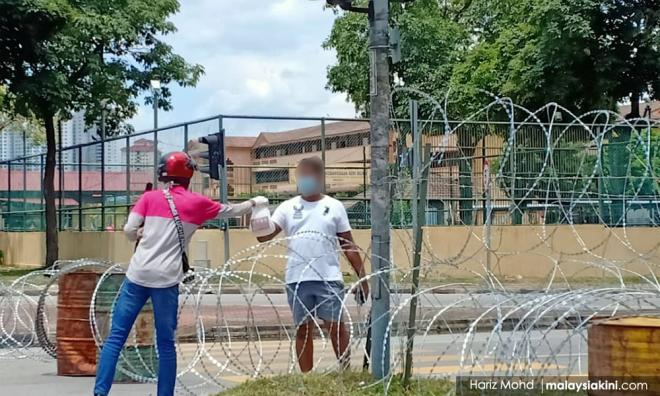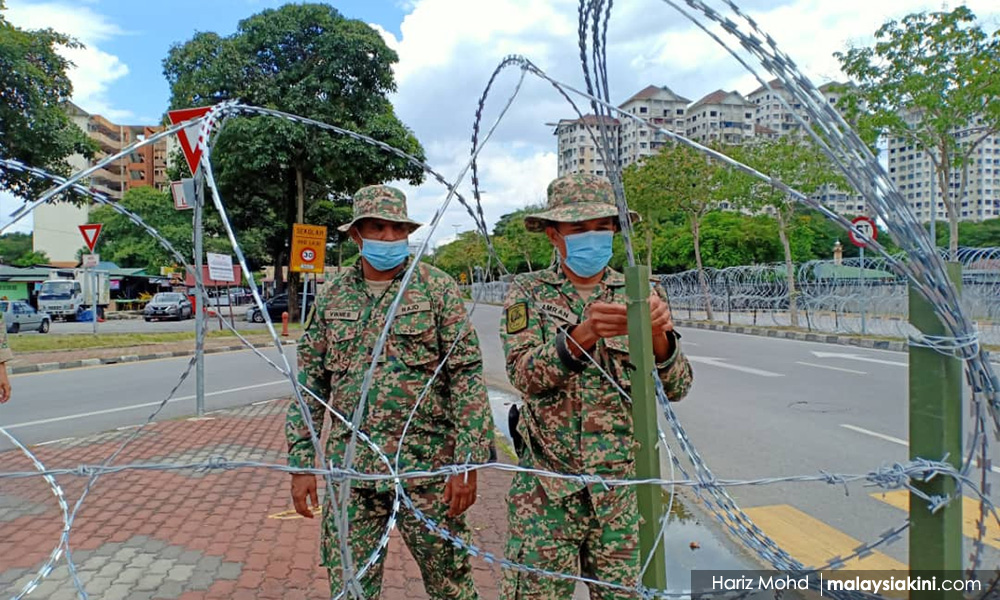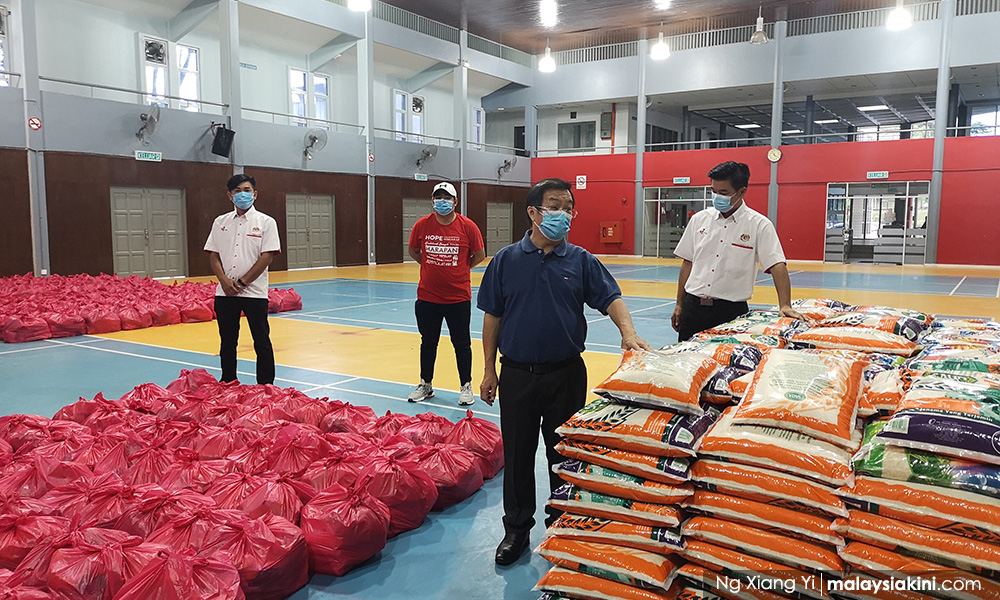
MP SPEAKS | Under Goal 2 of the Sustainable Development Goals, the right to adequate food is a universal human right that is realised when all people have physical and economic access at all times to adequate food or the means for its procurement, without discrimination of any kind.
Shockingly, Selayang Baru in Gombak is now suddenly placed as the seventh lockdown area under an enhanced movement control order (MCO). This adds to the growing fear that people can suddenly find themselves placed under severe restrictions without enough supplies.
Unfortunately, this has been implemented by invoking Section 18 of the National Security Council (NSC) Act, granting the council-wide and unfettered powers to declare a "state of emergency" in a designated area (also known as security area).
However, to suddenly declare lockdown areas and yet fail to ensure the continued supply of food, as seen in parts of Selayang after it was placed under the enhanced MCO, shows the lack of preparedness of the government to guarantee food security.
Recently I received two requests for aid from residents in Selayang who are in desperate need of food supplies. Residents there are placed under a stressful situation as they are not allowed to leave their homes to buy food and shops were closed without due notice. Many were caught unprepared and do not have enough supplies to last them even for a few days.
Despite the government’s promise that food will be sent to the area, food delivery was not carried out within 24 hours, leaving many people yet to receive anything.

While I understand the need to act quickly and decisively to isolate particular areas to contain the spread of Covid-19, we must not forget people’s access to food and that they are living in fear because of a lack of information and coordination to guarantee their survival during the enhanced MCO.
There is an urgent need for the government to work together with all parties including NGOs, private sector and elected representatives from all divides to guarantee food access in the designated enhanced MCO areas and also to the vulnerable communities especially the B40 nationwide.
This enhanced MCO has also brought up several disturbing issues relating to food distribution.
Centralised control over food distribution
The vision of “Shared Prosperity” is seriously tested when aid becomes politicised and food distribution is highly controlled by the government.
It was announced that food baskets will be distributed to each parliamentary constituency for the needy. However, on the ground, it was alleged that the government, through the Ministry of Women, Family and Community Development, was selective over where the aid was being distributed.
Many Opposition MPs, including myself, hardly received sufficient quantities of essential food items to be distributed to the needy.
The present government had allegedly cut off all Opposition MPs’ development funds when it came into power. I had to seek my own funding to buy food for the vulnerable in my constituency. I am lucky because many generous Malaysians contributed funds and donations in-kind to help those in need in Petaling Jaya.
However, many of the other Opposition MPs, despite having given out food supplies to many themselves, are struggling to cope with the growing requests for food, especially from enhanced MCO lockdown areas.
Lack of transparency on food distribution
Where have all the food baskets gone to? Cheras MP Tan Kok Wai stumbled upon loads of food baskets that were not distributed but stored for more than a week (below).

Recently, Senior Minister Ismail Sabri Yaakob denied claims that the value of the government food baskets only came up to RM35, saying that these baskets were from the civil society. Yet, at the same time, he failed to disclose the value of the government’s food baskets, how many were allocated per constituency and to whom they have been given?
Not reaching the deserving poor and marginalised
If the database on who is poor and where they are is available, it would have allowed aid to reach them faster. As civil society, parliamentarians and state assembly representatives struggle to get food on the table for the poor, it is also a stressful process to locate, verify and finally distribute the food.
On many occasions, I stumbled upon people who fell out of the “database” like an elderly woman who depended on her brother who lost his job because of the enhanced MCO, a daily wage-earning single mother who cannot go out to earn money to buy diapers for her paralysed son because of the lockdown, a single mother of seven who struggled to feed her family, and many more.
It also brings up the fact that women suffer the most if they are the single female heads of households.
Migrant workers, refugees and marginalised communities are finding it hard to get food when they are daily wage earners or when employers must stop work due to the enhanced MCO.
I have encountered four migrant workers sharing a single packet of instant noodle a day, while another 200 Bangladesh migrant workers were left to share 100 packets of take-aways between themselves.

I urge the government to take food security and the right to have access to food more seriously and implement the following suggestions:
(i) Decentralise and democratise the distribution of food to allow the Welfare Department to work with parliamentarians, civil society as well as other government agencies to get food quicker to the needy.
(ii) Have an effective, transparent and accessible database so that marginalised communities and the most vulnerable people including the elderly, the disabled and migrant workers do not get left out from receiving aid. This information should be shared right down to the humanitarian groups working on the ground to reduce the possibility of people being left out.
(iii) Utilise the latest technologies such as Big Data, 5G and AI to better coordinate supply chains within industries to help with the manufacturing and production of food, medical supplies and other essential items during the MCO. Build a sustainable domestic food supply in the long run.
(iv) Form a cross-party emergency council made up of professionals and experts in healthcare, social services, investments, banking and food security to build a road map for the implementation of key policies during and post-Covid 19 so that we are better prepared and coordinated for the future.
(v) Activate the Parliament Select Committees to be part of the cross-party emergency council to develop a strategic plan post-Covid-19. The aim is to plan not just for economic recovery and sustainability but to build a more resilient social safety net for all.
Sadly, at times like these, there are Malaysians who are starving and being made to live like in an active warzone without any knowledge of when their situation might change.
For the immediate and in the long term, strategic planning has to start now, otherwise, Malaysia will suffer.
MARIA CHIN ABDULLAH is the Member of Parliament for Petaling Jaya. - Mkini


No comments:
Post a Comment
Note: Only a member of this blog may post a comment.